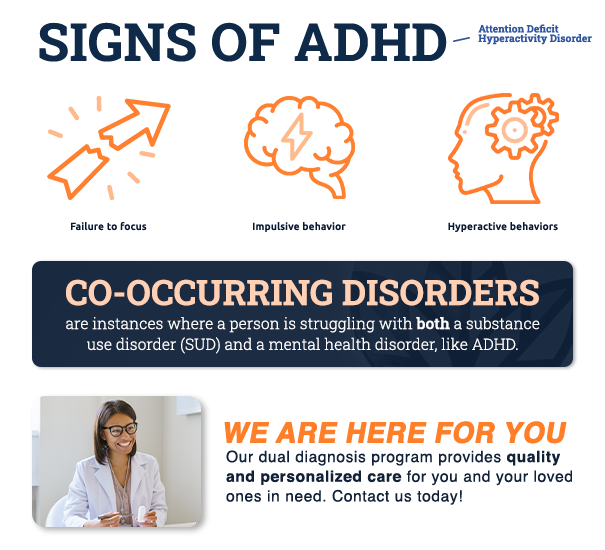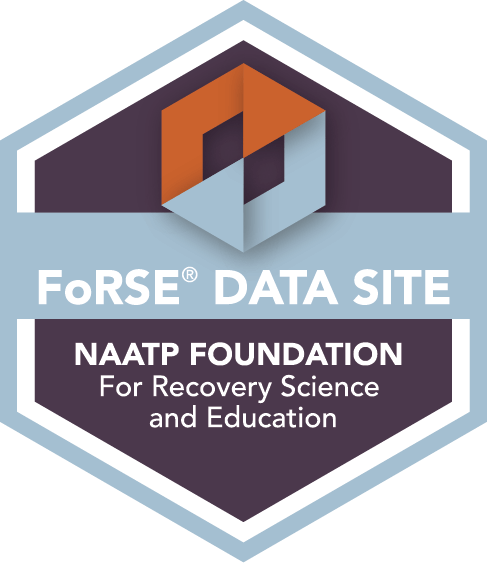Co-occurring disorders can be especially disruptive and complicated. Co-occurring disorders occur when a person deals with both a mental illness and substance use. These two conditions can feed off each other and make it extremely hard to function. Co-occurring disorders like ADHD and substance abuse can enhance a person’s need to self-medicate.
Suffering from a mental illness like ADHD can push someone toward drug and alcohol abuse as a way of coping. This can evolve into a stressful and complicated situation that requires professional attention. If you or a loved one is dealing with a co-occurring disorder, Northern Illinois Recovery Center is here to help. Individuals who are suffering from ADHD and substance abuse can find the help they need here at our facility.
Unfortunately, there is a connection between ADHD and addiction. Some people dealing with ADHD may turn to drugs and alcohol as a way to cope or self-medicate. This can end up leading to full-blown addiction. As time goes on, these two conditions can end up feeding off each other, which creates a vicious and dangerous cycle of dependence and drug abuse to cope.
What Are the Symptoms of ADHD?
Specific signs and symptoms include:
- Trouble listening to other people
- Frequently forgetting things
- Easily distracted
- Fidgeting
- Trouble staying organized
- Losing items
- Trouble controlling actions or speech habits
- Trouble finishing tasks
ADHD symptoms vary from person to person and, in some cases, can be more severe than others. ADHD can be hard to deal with daily; it may interfere with school, work, and home life. This is why a portion of those who deal with ADHD end up relying on drugs and alcohol to cope.

What Is a Substance Use Disorder (SUD)?
- Alcohol
- Heroin
- Cocaine
- Opioids
- Hallucinogens
- Methamphetamines (meth)
- Xanax
- Marijuana
- Pain relievers and other prescription drugs
What Are the Symptoms of Drug Addiction/Substance Use Disorders?
It’s important to look out for the signs and red flags of potential drug addiction, especially in those dealing with both ADHD and drug abuse. Common signs of drug addiction/abuse may include the following:
- Cravings or urges to use drugs frequently (sometimes several times a day)
- Building a tolerance to drugs or alcohol (i.e., needing more for the desired effect)
- Worsened performance at school, work, or home
- Failing to meet responsibilities and daily obligations
- Engaging in risky behavior while under the influence
- Attempts to stop using the drug, but is unable to
- Suffering from withdrawal symptoms when not using the drug or drinking
- Spending time and money trying to obtain the drug
- Continuing drug use even if it’s causing problems
Drug use can end up ruining a person’s life if they don’t get help. It is also worth noting that drug addiction looks different from person to person. Since no two cases of addiction are the same, it’s important to turn to a trusted rehab center like Northern Illinois Recovery.
ADHD and Drug Abuse as Co-Occurring Disorders
Tackling ADHD and addiction can be especially tricky because the same medications that are used to treat ADHD can end up being addictive themselves. Stimulants (e.g., Adderall, Ritalin, etc.) have a high risk of dependency and abuse. This is why it’s extremely important to have a professional team monitoring the administration of these medications.

Dual Diagnosis Treatment
While dual diagnosis cases can be complex, professional treatment can help a person overcome both of their conditions. Dual diagnosis treatment is usually a mix of therapy, self-help, counseling, family therapy, and medication-assisted detox (in some cases). ADHD and substance abuse can be extremely destructive, but it is never too late to reach out for help. Dual diagnosis treatment centers on:
- Creating a safe and open environment for treatment
- Educating family members and loved ones about ADHD and addiction
- Identifying and focusing on triggers for substance use
- Learning how to manage cravings and impulses
- Improving personal motivation and building self-esteem
- Changing behaviors that frequently lead to substance use and drinking
During the process, the symptoms of ADHD will be alleviated while the person focuses on specialized treatment options, like therapy.
What to Expect During Dual Diagnosis Treatment
Drug and alcohol detoxification is a crucial part of the process and can be seen in nearly every case of drug addiction. Detox is especially important in co-occurring disorder cases because the physical aspects of drug addiction must be treated first. Detox is a process of ridding the body of toxic substances. This should be done under medical supervision and a professional team. Detoxing at home (often called “cold turkey”) is not recommended because detox can be unpredictable and dangerous at times. After detox comes more personalized and specific treatment.
In many cases, a person will proceed to residential treatment after detox. This program has a person living and sleeping in a rehab center for the remainder of their treatment. Each person has their own structured schedule in a safe environment. The time spent at the rehab center depends on the severity of a person’s addiction. Inpatient offers the best chance for long-term recovery, especially for dual diagnosis.
Therapy plays an essential part in the recovery process, as well. When dealing with both ADHD and substance abuse, therapy is extremely important. Psychotherapy (individual or group) helps a person change, cope, and understand their addiction/mental disorder. Behavioral therapies like cognitive behavioral therapy (CBT) play huge roles in treating both ADHD and addiction. Dual diagnosis treatment involves alleviating the physical aspects of addiction, as well as setting up a person for the future.
ADHD and Addiction FAQs
Several shared factors contribute to the high rate of co-occurring ADHD and addiction. Individuals with ADHD may use substances as a form of self-medication to cope with symptoms like impulsivity, restlessness, or emotional dysregulation. Also, the inherent impulsivity and reward-seeking behavior associated with ADHD can increase the risk of experimenting with and misusing drugs and alcohol.
The duration of dual diagnosis treatment varies significantly based on the individual’s specific needs and the severity of symptoms. Generally, a comprehensive treatment program may last from 90 days to a year or more to ensure stability and lasting recovery. The most effective approach is a long-term continuum of care, which can include residential treatment, intensive outpatient programs, and ongoing outpatient therapy.
Yes, individuals with a substance use disorder (SUD) can often safely take ADHD medication under strict medical supervision. Healthcare providers typically prefer non-stimulant medications or specific long-acting, abuse-deterrent formulations of stimulants to minimize the risk of misuse. This decision is made on a case-by-case basis after a thorough assessment by an addiction specialist.
People with ADHD may have different physiological and psychological reactions to drugs and alcohol compared to neurotypical individuals. Due to differences in brain chemistry, some individuals with ADHD might not experience the same euphoric effects from stimulants, potentially leading to higher usage in an attempt to feel “normal” or self-medicate. This altered response can, unfortunately, accelerate the path from use to dependence and addiction.
Most insurance plans provide coverage for the treatment of dual diagnosis conditions like ADHD and substance use disorder. The extent of coverage, including co-pays and deductibles, depends on your specific insurance provider and policy details. Our admissions team is happy to help you understand your insurance benefits. Contact us to verify your insurance.
Start the Journey at Northern Illinois Recovery
Don’t wait for things to get worse; contact us to start the journey toward a better life. Let us help you address ADHD and substance abuse in your life today.





